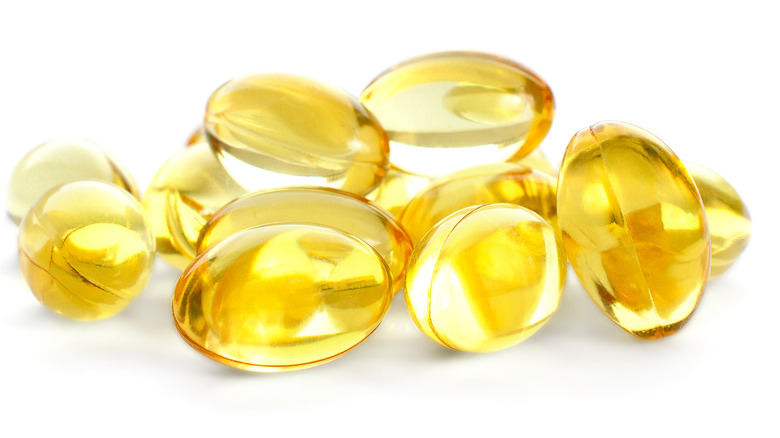What's The Difference Between EPA And DHA?
We have all heard about the amazing health benefits of omega-3 essential oils, right? You know, those healthy fats that are found in fish, nuts, and seeds that have been linked to a whole slew of beneficial medicinal properties. Healthline reports that omega-3 fatty acids have been shown in scientific studies to do everything from improve brain and eye health to help prevent heart disease and possibly cancer; these fatty acids may also prevent depression and other mental disorders and play a role in helping the body burn fat. That's some seriously healthy fat.
But those trying to integrate omega-3 oils into their diet are finding that it's not quite as simple as it sounds at first. That is because there are several different kinds of omega-3 oils, and different effects and characteristics have been found in each of them. According to the Harvard T.H. Chan School of Public Health, there are in fact three main kinds of omega-3s: alpha-linoleic acid (ALA), eicosapentaenoic acid (EPA), and docosahexaenoic acid (DHA). Both EPA and DHA are derived from fish sources and are often called marine omega-3s, but what are the differences between the two?
What exactly is DHA and how does it benefit me?
DHA is actually found alongside EPA in coldwater fish like salmon, mackerel, tuna, sardines, cod, and herring, according to The Functional Neurology Center. DHA is different from EPA, however, in that its beneficial effects seem to be uniquely concentrated in the brain and organs of the head, like the eyes (via Healthline). DHA is the omega-3 supplement of choice for those who want to treat depression, boost cognitive function, and improve memory performance as it improves how well neurons communicate and increases their flexibility and overall function (via The Functional Neurology Center).
In fact, a 2015 study published in Maternal & Child Nutrition found that the amount of DHA in mother's milk directly predicts the cognitive performance of children, as measured by math scores. In regard to eye health, Harvard Health Publishing cited a study that found that DHA had been found to prevent age-related vision loss in laboratory mice.
How EPA helps your heart and body
According to The Functional Neurology Center, while DHA gives you powerful, cognitive enhancing benefits, EPA is an omega-3 fatty acid that helps combat inflammation throughout the body. For those looking to address swelling or pain, whether arthritis or in muscles, EPA may be a good source of relief. But its medicinal properties don't stop there. According to Mount Sinai Medical Center, EPA also has beneficial effects on your cardiovascular system and can lower your risk of a heart attack, lower your blood pressure, and even keep your arteries healthy.
The Harvard Gazette cites studies that have shown that high doses of EPA can lower the incidence of cardiac events in patients who are at high risk for a heart attack. While it used to be thought that EPA exhibited stronger anti-inflammatory powers than DHA, a 2020 study published in the journal Atherosclerosis found that the two related compounds actually work differently on inflammation, suppressing different gene markers and limiting the inflammation response in different ways. People who include both DHA and EPA omega-3s in their diet on a regular basis are getting solid doses of healthy fats that not only benefit the brain and the heart but provide powerful anti-inflammatory actions in the body as well.



